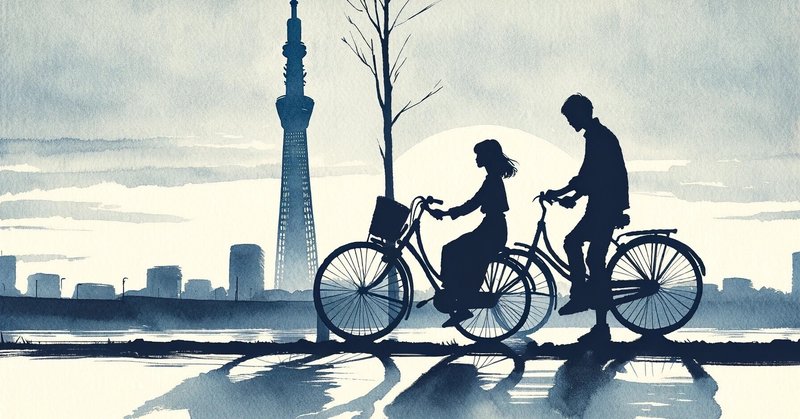
ゆっくりと人生を愛せる世界で、優しく生きる | Living Gently in a World Where You Can Slowly Love Life
あなたの「完璧な一日」とは? 何が完璧にするのか? もしかしたら、毎日を完璧にするルーティンを完璧にこなすことかもしれない。
What is your “Perfect day”? What makes it perfect? Maybe we could perfect a routine that makes everyday perfect.

映画『PERFECT DAYS』が、日々の生活の中に潜む深い美しさと生きる哲学を探求し、世界の注目を集めた。トイレ清掃員の穏やかな日常を通じて、この作品はカンヌ国際映画祭で最優秀男優賞を受賞し、アカデミー賞の国際長編映画賞にノミネートされるという栄誉を獲得。何がそこまでの評価を引き出したのか、自らの目で確かめるべく映画館に足を運んだ。m
"PERFECT DAYS" captivated the world with its exploration of the deep beauty and philosophy hidden in everyday life. Through the tranquil daily routine of a toilet cleaner, this film won the Best Actor award at the Cannes Film Festival and was nominated for the Academy Award for Best International Feature Film. Intrigued by what garnered such acclaim, I decided to see for myself and headed to the cinema.
主人公の平山は、朝、神社掃除の箒の音で目覚め、(目覚ましなし!)、洗顔に歯磨き、台所から霧吹きを持って、2階に上がり、たくさんの小さな植物たちに葉水して、微笑みかける。玄関を出て空を見上げて、笑みを浮かべ、ドアを閉める。10メーターのところにあるアパートの駐車場の自販機で、カフェオレを買う。車に乗り込んで、70年代〜80年代の洋楽のカセットを選んで音楽を流す。スカイツリーの見える東京下町から首都高に乗って、トイレの近くに車を止めて、トイレ掃除がはじまる。東京のデザイナーズトイレを任されている。トイレ掃除が終わると、オープンと同時に銭湯へ。夜は浅草の駅構内にある行きつけの飲み屋で食事を済ませ、家に帰って寝るまで本を読み、眠くなったら電気を消して就寝。そしてまた朝になり…
The protagonist, Hirayama, wakes up in the morning to the sound of sweeping at the shrine (no alarm clock needed!), washes his face, brushes his teeth, grabs a spray bottle from the kitchen, and heads upstairs to water his numerous small plants, smiling at them. Stepping out, he looks up at the sky, smiles, and closes the door. At a vending machine located 10 meters away in the apartment parking lot, he buys a café au lait. Getting into his car, he selects a cassette of Western music from the 70s and 80s to play. He drives from the downtown area of Tokyo, visible from the Skytree, onto the expressway, parks near the toilets, and begins cleaning. He is entrusted with cleaning Tokyo's designer toilets. After finishing the cleaning, he heads to a public bath as soon as it opens. At night, he finishes his meal at his favorite bar located inside Asakusa Station, reads a book at home until he feels sleepy, then turns off the light to sleep. And then, it becomes morning again...
なんと、日本の映画ではない。ドイツ人の監督の映画だ。言われてみれば、「東京」の切り取り方が外国人目線でもある。レトロな場所が、東京人の私にとってもクールに見えた。セリフの少なさが圧倒的で、見るものが想像力を働かせるゆとりがあり、それがまた楽しい。
Surprisingly, it's not a Japanese film but one directed by a German. Now that you mention it, the perspective on "Tokyo" does seem to come from an outsider's viewpoint. Even to me, a Tokyoite, the retro places depicted in the film looked cool. The scarcity of dialogue is overwhelming, allowing viewers the leisure to exercise their imagination, which adds to the enjoyment.
あとから、ヴェンダース監督が映画についてひとりで語っている映像を見た。監督は横からのアングル。奥の白い壁には、うっすらと影が揺れて見える。なんだか、映画の続きを見ているかのような美しい映像だった。そのインタビューで、平山の過去が明かされた。
Later on, I watched a video of Director Wenders talking alone about the movie. The shot was taken from a side angle. Faint shadows could be seen fluttering on the white wall in the background. It was a beautiful video, almost as if watching an extension of the movie itself. In that interview, Hirayama's past was revealed.
私もそこからさらに想像力を広げてみた。確かに、トイレ掃除もあれだけ細かければ、仕事もできた人なのだろう。整然と並べられた単行本。現像された写真が、シルバーの缶に年代ごとに整理されている。聴いている音楽は、洋楽ばかり。あの○×のゲームに応えるユーモアセンスは、サラリーマンのなかでは必要ないだろう。(映画を観て!)
This inspired me to broaden my imagination further. Surely, someone who cleans toilets with such meticulous care must have been proficient in his work. Books are neatly aligned. Developed photos are organized by era in silver cans. The music he listens to consists solely of Western songs. The sense of humor required to respond to that tic-tac-toe game is probably unnecessary among salarymen.Watch the movie!
そしてこの映画が、僧侶からインスパイアされていることも知った。平山の無駄のない生活。物はないけれど心は豊か。一日一日を、毎日新しい日として過ごすことに満足している。この境地に至ってしまえば、人生は幸せなのだろうか?
I also learned that this movie was inspired by a monk. Hirayama's life is devoid of waste. He lacks material possessions, but his heart is rich. He is content with living each day as a new day. Once one reaches this state, I wonder, is life considered to be happy?
私自身も、映画の中で描かれる生き方に共感を覚え、組織から離れ、独立した後、多くの人との出会いを求めたものの、やがては自分自身と向き合うことの大切さを学んだ。今、私はルーティンを大切にしながらも、その中にある小さな変化を楽しむことができるようになった。評価や結果を気にして、心もザワザワしていた。今は平穏で幸せを感じることが増えた。自分で小さな幸せを見つけて、ひとり微笑むこともある。
I too felt a resonance with the way of life depicted in the movie. After leaving an organization and becoming independent, I sought encounters with many people, but eventually learned the importance of confronting myself. Now, I cherish my routine while also enjoying the small changes within it. I used to fret over evaluations and results, which unsettled my mind. Now, I feel more at peace and experience happiness more frequently. I can even find small joys on my own and smile to myself about them.
そんなルーティンの中に、たまにイベントが入ってくる。そうすると、そのイベントをとても楽しむこともできる。今を生きることができている。心が自由で人にも物にも縛られていない。毎日を新しい一日と思えている。ほとんどルーティンの暮らしなのに。いや、ルーティンが変わらないからこそ、変化に気づきやすいのだ。
Within such a routine, occasionally, an event comes along. When it does, I find myself able to thoroughly enjoy that event. I am living in the moment. My heart is free, unbound by people or things. I view each day as a new day, despite mostly living a life of routine. It is precisely because the routine does not change that I can easily notice changes.
映画の最後、平山の泣き笑いの様な表情に、私も微笑んでいた。わかる。10年前の私だったら、「私にもそんな境地に至る日が来るのだろうか?」と思ったに違いない。この映画はある意味、試されている。映画の最後に見せる平山の泣き笑いのような表情は、人生の幸せとは何かについての深い洞察を示唆している。
At the end of the movie, I found myself smiling at Hirayama's expression of tears mixed with laughter. I understand. Ten years ago, I might have wondered, "Will I ever reach such a state?" In a way, this movie is a test. The expression of mixed tears and laughter shown by Hirayama at the end of the movie suggests a deep insight into what happiness in life means.
「こんどはこんど、今は今」。平山とその姪の銭湯の帰り道、自転車で通った桜橋の上での会話だ。ミニマムな暮らしから、最大限の幸せを生み出すための魔法の言葉だ。
"Next time is next time, now is now." This was a conversation between Hirayama and his niece on their way back from the public bath, as they cycled over Sakura Bridge. It's a magical phrase for generating the utmost happiness from a minimalist lifestyle.
■編集後記
「コンフォートゾーンを抜け出せ!」とよく聞かれますが、ひょっとしたら、私たちはそもそも自分の真のコンフォートゾーンをまだ見つけていないのかもしれません。心地よい場所、本当に自分らしくいられる場所を探求する旅は、まず自分自身が何に心地よさを感じるのかを理解することから始まります。今を生きる1D1U Campの旅は、真のコンフォートゾーンを作っていくキャンプです。
★4/8 からはじまる1D1U Camp「最小限を最大に生かす」最終案内です。

この記事が気に入ったらサポートをしてみませんか?
